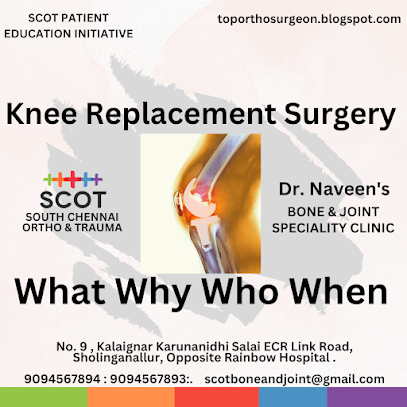Considering Knee Replacement Surgery? An Orthopaedic Surgeon Explains
Hi there, I'm Dr. Naveen and I'm an orthopaedic surgeon. Today, I want to talk about knee replacement surgery, a procedure that can dramatically improve quality of life for many people.
What is Knee Replacement Surgery?
Imagine your knee joint as a hinge. Over time, due to wear and tear, mostly from arthritis, the smooth cartilage cushioning the joint breaks down. This can cause pain, stiffness, and make even simple activities like walking difficult. Knee replacement surgery, also called arthroplasty, replaces the damaged surfaces of your knee joint with artificial implants made of metal and strong plastic.
Who is a Candidate for Knee Replacement?
If you have severe knee pain that limits your daily activities, and conservative treatments like physical therapy, medication, and injections haven't provided enough relief, then knee replacement surgery might be a good option for you. It's important to understand that this is typically an elective surgery, so we'll discuss all your options and weigh the risks and benefits together.
What Benefits Can You Expect?
The primary goal of knee replacement is to reduce pain and improve your ability to move. After successful recovery, patients often experience significant pain relief and increased mobility. This can allow you to get back to activities you enjoy, like walking, hiking, or playing with your grandkids.
Setting Expectations: Recovery and Beyond
While knee replacement can be life-changing, it's important to set realistic expectations. Recovery is a gradual process that takes dedication and hard work. Physical therapy will be crucial in regaining strength and flexibility in your new joint. You may be a marathon runner after surgery, but you can expect to walk comfortably, climb stairs without difficulty, and participate in low-impact activities.
Thinking about Knee Replacement?
If you're considering knee replacement surgery, the best first step is to schedule a consultation with an orthopaedic surgeon. We can discuss your specific situation, answer your questions in detail, and help you decide if this is the right path for you. Here are some additional points to consider:
- Age is not the only factor: While knee replacements are often performed on older adults, there's no strict age limit. Generally, if you're healthy enough to undergo surgery and have realistic expectations, you can be a candidate.
- Minimally invasive techniques: Advancements in surgical techniques have led to the development of minimally invasive approaches for knee replacement. This can result in quicker recovery times and less pain. We can discuss if you're a candidate for these techniques during your consultation.
- Bilateral knee replacement: If both knees are severely arthritic, we can discuss the possibility of replacing both knees in a single surgery or staging them over time. There are pros and cons to each approach, and we'll tailor the plan to your specific needs.
Long-Term Considerations: While artificial knees are durable, they are not indestructible. Activities with high impact or repetitive stress, such as running or jumping, can shorten the lifespan of your implant. We'll discuss these considerations during your consultation and help you create a plan to protect your new joint and maximize its longevity.
Remember, knee replacement is a major surgery, but with proper planning, preparation, and a commitment to rehabilitation, it can be a successful way to regain your mobility and improve your quality of life.
Dr. Naveen Chowdary Tummala
SCOT: Dr. Naveen's Bone & Joint Clinic , Sholinganallur,
9094567893 , 9094567894

Comments
Post a Comment